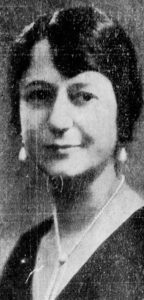
Photo info ...
(1879 – 1972). Sara Messing Stern was a lifelong community advocate for Progressive reform, women’s suffrage, and civil rights. She used her upper-middle-class status and education to promote these and other causes in the Indianapolis and Terre Haute communities. Her family’s commitment to social justice, along with her Jewish faith and values of compassion, shaped her leadership and advocacy.
Messing Stern was born in Indianapolis to German-speaking Jewish immigrants and Riekchen “Ricca” Messing. She graduated from in Indianapolis.
She married Leon Stern, an auditor for an Indianapolis coal company, on June 20, 1906. During this period, her activism for social justice began in earnest. Messing Stern became a leader in the local chapter of the (NCJW) and worked as the superintendent of that organization’s Religious Sunday School. In 1911, she was appointed executive director of the Nathan Morris House, a settlement home for Jewish immigrant families in Indianapolis, where she helped provide food, medical assistance, and educational programs to ease the burdens faced by the community.
In 1909, Messing Stern met Grace Julian Clark, a key figure in the women’s suffrage movement. The friendship they developed as their club and charity work overlapped over the next few years may have influenced Messing Stern’s suffrage work.
When Messing Stern and her husband moved to Terre Haute, Indiana, in 1911, she assumed a leadership role in that city’s Women’s Franchise League (WFL). The next year, Messing Stern asked WFL board members for guidance on incorporating and collaborating with local Black women who were also seeking the franchise. While the board stated its support for Black women’s voting rights, it did not provide Messing Stern the requested support.
During the 1910s, Messing Stern traveled across Indiana to campaign for women’s right to vote, remaining determined in the face of antisemitism and marginalization within predominantly Christian suffrage organizations. Alongside fellow suffrage activists, Messing Stern witnessed the culmination of their campaign on January 17, 1920, when they surrounded Indiana governor James Putnam as he signed the state’s ratification resolution for the 19th Amendment to the US Constitution.
Aside from her suffrage work, Messing Stern remained active in numerous women’s clubs and charitable organizations, especially ones in her former home city of Indianapolis The Woman’s Press Club of Indiana, an organization of women journalists and activists founded in 1913, elected her as club president in 1927, partly due to her status as a published poet. Four years later, in 1931, Messing Stern was elected president of the Indiana Federation of Temple Sisterhood at its annual convention in Fort Wayne. Later, she served as president of the Borinstein Home for the Aged in Indianapolis. In September 1939, she chaired the Indianapolis Handicraft Exchange to raise money for Jewish refugees then fleeing Nazi Germany. In 1943, she shared reflections on local Jewish news, nostalgia, and societal issues in her regular column in the of Indianapolis.
In 1949, Stern helped establish the first Hoosier Institute on Civil Rights meeting, titled “To Secure These Rights,” at the Kirschbaum Jewish Community Center in Indianapolis. More than 300 people attended this day-long program, sponsored by the NCJW’s Indianapolis chapter, which was aimed at advancing equal rights for Black Americans. The event featured speakers from prominent civil rights organizations, including the . Later, Messing Stern chaired the Interfaith and Interracial Committee of Indianapolis’s NCJW chapter, working to foster cooperation among the city’s various religious and racial groups.
Messing Stern married George Harding in 1951 after having been widowed since 1934. The couple moved to Connecticut, where she continued her work with civic and religious organizations. During her lifetime, Messing Stern strove to expand rights and improve material conditions for marginalized populations in Terre Haute, Indianapolis, and beyond. Importantly, Messing Stern helped advance the idea that Progressive Era women needed the right to vote to exert political power if they wanted to usher in enduring change for future generations.
FURTHER READING
- Morgan, Anita. We Must Be Fearless: The Woman Suffrage Movement in Indiana. Indianapolis: Indiana Historical Society, 2020. http://public.eblib.com/choice/PublicFullRecord.aspx?p=6527785.
- Simins, Jill Weiss. “‘The Greater Creed:’ How Suffragist Sara Messing Stern Overcame Antisemitism through Verse.” Untold Indiana, May 30, 2023. https://blog.history.in.gov/sara-messing-stern/.
CITE THIS ENTRY
APA:
Brown, M. (2025). Sara Messing Stern. Encyclopedia of Indianapolis. Retrieved Feb 15, 2026, from https://indyencyclopedia.org/sara-messing-stern/.
MLA:
Brown, Michael J. “Sara Messing Stern.” Encyclopedia of Indianapolis, 2025, https://indyencyclopedia.org/sara-messing-stern/. Accessed 15 Feb 2026.
Chicago:
Brown, Michael J. “Sara Messing Stern.” Encyclopedia of Indianapolis, 2025. Accessed Feb 15, 2026. https://indyencyclopedia.org/sara-messing-stern/.

Help improve this entry
Contribute information, offer corrections, suggest images.
You can also recommend new entries related to this topic.